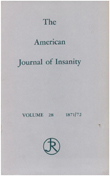Lack of sex differences in the neuropsychological performance of patients with schizophrenia
Abstract
OBJECTIVE: While a number of studies have suggested that women with schizophrenia have a less severe form of the disorder than men, the issue has been examined with neuropsychological measures only infrequently. METHOD: The authors compared neuropsychological test performances of men and women from four independent schizophrenic cohorts: two groups of inpatients with chronic courses at a research hospital (N = 128 and N = 63), one group of consecutive admissions to a private psychiatric hospital (N = 57), and one group of schizophrenic twins from discordant monozygotic pairs (N = 20). Nearly 100 comparisons of neuropsychological test performances were made between men and women. RESULTS: Not one comparison significantly favored women, and few were even significantly different between the sexes. CONCLUSIONS: It cannot be ruled out that the disproportionate number of men in the chronic cohorts may have reflected either more frequent intellectual deterioration in men or a bias toward more severely impaired women. Yet, men and women in all groups performed similarly, including the groups in which the sex ratios were nearly equal and were not skewed toward chronicity. These results provide little support for the hypothesis that gender is associated with a unique pathogenesis of schizophrenia or is a marker for a distinct subtype of schizophrenia, at least to the extent that cognitive impairment is a primary manifestation of the underlying disease process. However, given the lack of female patients with later ages at onset and more affective symptoms, the results in this study should be considered relevant only for chronic patients with onset of schizophrenia before age 30.
Access content
To read the fulltext, please use one of the options below to sign in or purchase access.- Personal login
- Institutional Login
- Sign in via OpenAthens
- Register for access
-
Please login/register if you wish to pair your device and check access availability.
Not a subscriber?
PsychiatryOnline subscription options offer access to the DSM-5 library, books, journals, CME, and patient resources. This all-in-one virtual library provides psychiatrists and mental health professionals with key resources for diagnosis, treatment, research, and professional development.
Need more help? PsychiatryOnline Customer Service may be reached by emailing [email protected] or by calling 800-368-5777 (in the U.S.) or 703-907-7322 (outside the U.S.).



